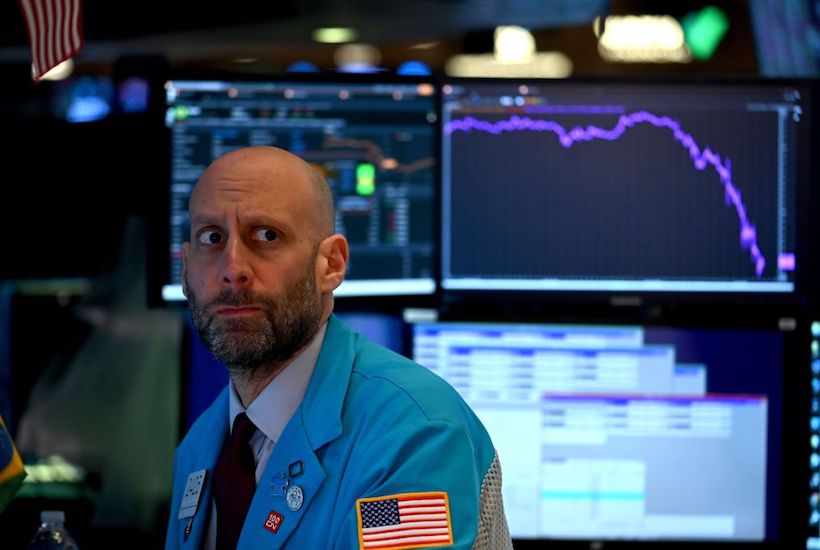It’s possible for both of the following statements to be accurate: 1. To stem this coronavirus pandemic, economic activity needs to be completely shut down – either indefinitely or for a fixed and possibly lengthy period. 2. Shutting down the economy will cause distress, death and devastation like we have never seen before.
People have been very quick to assume Statement No. 1 is correct but I fear far too quick to dismiss Statement No. 2.
In 2008, governments around the world feared the global financial system would collapse. At the time I was working in investment banking for a firm that didn’t make it. Working for a company that is collapsing is about as tough an experience as there is in professional life; working in a financial system tinkering on collapse even more so. In the weeks after Lehman Brothers filed for bankruptcy, my colleagues and I existed in a surreal state. We started to wonder whether the global economy is just vapourware; whether this was an Emperor’s New Clothes moment for the modern economy. We pondered how we’d manage if money ceased to have value and the world returned to a subsistence economy. “I can knit” a colleague offered.
It was a fundamental existential moment where we began to question everything we once thought was real. It felt like standing on a precipice, staring into a deep, dark abyss.
I’ve been reflecting on that time a lot over the past eight weeks since I saw the first photos of people collapsed in the streets of Wuhan; since the Chinese government announced a lockdown affecting nearly 60 million people; since talk of “social distancing” took hold; since governments began mandating complete economic shutdowns and physical lockdowns. Economies are facing a complete collapse stemming from the purging of all but the bare minimum of demand.
Yes, there is a global pandemic and lives are at stake; health systems on the brink. It may also be the greatest financial crisis ever known.
Small business owners will see revenue fall to zero overnight. Employees will be told there’s no more work and no more pay. Landlords won’t receive any rent payments. This contagion will spread through the economy faster than any virus through any population.
Unlike a decade ago, this crisis won’t primarily impact people in high rise office buildings who stare at spreadsheets and documents all day. This one will decimate the heart of our economy – small business owners, bricks and mortar businesses and the service industries. Cafes, restaurants, bars, hairdressers, day spas, florists, electronics, clothing, homewares, film & TV production, nurseries, personal trainers, gyms, musicians, caterers, event organisers, office cleaners, retail stores, taxis and many more. And the suppliers, tradesmen, landlords and other businesses who service — and rely — on them.
Regular people all over the world are now questioning everything they thought was real. They are standing on a precipice, staring into a deep, dark abyss.
Commentators who’ve dared question whether the impact of an economic shutdown may be worse than the virus itself, politicians who’ve exercised caution before taking decisions that will destroy businesses and jobs, are howled down in a barrage of criticism led by high profile personalities.
Unlike previous global crises, this one is being played out Twitter and Facebook. There is a public vibe that’s also flying through the population like a virus. The Vibe demands that schools, businesses, all of public life shut down sooner and harder, notwithstanding what epidemiologists might say.
The Vibe overwhelmingly says “the government should support the economy”. But, it’s the other way around – the economy supports the government. Without economic activity, there are no taxes. And there’s not a never-ending supply of government debt and, in any event, only so much a country can bear. Last month Alexandria Ocasio-Cortez said “it is a physical impossibility to lift yourself up by a bootstrap”. She’s right; but not in the way she thinks.
The thing is — the Vibe is fickle. It can change overnight too. Every worker now lining up in the dole queues, every small business owner facing imminent collapse, every tradesman wondering if their invoices will ever be paid; all of them will very soon be focussed on Statement No. 2. Politicians know this. Donald Trump has indicated that two weeks is the most he will bear an economic shutdown. Even Democratic Governor of New York, Andrew Cuomo, has now foreshadowed a return to economic activity saying “you can’t stop the economy forever… it is unsustainable to run this state or run this country with the economy closed down.”
During my experience on the precipice of the abyss, I observed that crises bring out a person’s true character. Some people in charge are managers. Some are leaders. In a crisis you’ll find out which. Some people keep their heads, and those that can will engender calm and sensible action in others. Others will not. A disappointment for me over the past few weeks has been seeing commentators I used to respect emoting on Twitter with every thought and feeling that comes upon them.
Also as for 2008, this crisis reminds me that the mantra “listen to the experts” – be they financial geniuses or scientists – is not as simple as it sounds. Governments are trying to listen to the scientists but scientists don’t always agree, their models involve art as well as science and people don’t always like the consequences of listening to them.
Elizabeth Henderson is Commercial Director at Nyungga Black Group
Got something to add? Join the discussion and comment below.
Got something to add? Join the discussion and comment below.
Get 10 issues for just $10
Subscribe to The Spectator Australia today for the next 10 magazine issues, plus full online access, for just $10.


























Comments
Don't miss out
Join the conversation with other Spectator Australia readers. Subscribe to leave a comment.
SUBSCRIBEAlready a subscriber? Log in